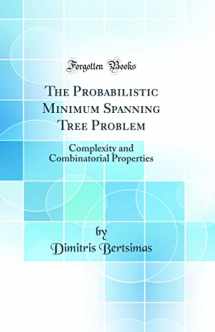
The Probabilistic Minimum Spanning Tree Problem: Complexity and Combinatorial Properties (Classic Reprint)
Book details
Summary
Description
Excerpt from The Probabilistic Minimum Spanning Tree Problem: Complexity and Combinatorial PropertiesIn this paper we consider a natural probabilistic variation of this classical problem. In particular, we consider the case where not all the points are deterministically present, but are present with certain probability. Formally, given a weighted graph G (v, E) and a probability of presence p(s) for each subset S of V, we want to construct an a priori spanning tree of minimum expected length in the following sense: on any given instance of the problem delete the vertices and their adjacent edges among the set of absent vertices provided that the tree remains connected. The problem of finding an a priori spanning tree of minimum expected length is the probabilistic minimum spanning tree (pmst) problem. In order to clarify the definition of the pmst problem, consider the example in Figure 1. If the a priori tree is T and nodes are the only ones not present, the tree becomes ti. One can easily observe that if every node is present with probability p. 1 for all i E V then the problem reduces to the classical mst problem.About the PublisherForgotten Books publishes hundreds of thousands of rare and classic books. Find more at www.forgottenbooks.comThis book is a reproduction of an important historical work. Forgotten Books uses state-of-the-art technology to digitally reconstruct the work, preserving the original format whilst repairing imperfections present in the aged copy. In rare cases, an imperfection in the original, such as a blemish or missing page, may be replicated in our edition. We do, however, repair the vast majority of imperfections successfully; any imperfections that remain are intentionally left to preserve the state of such historical works.


We would LOVE it if you could help us and other readers by reviewing the book
Book review



